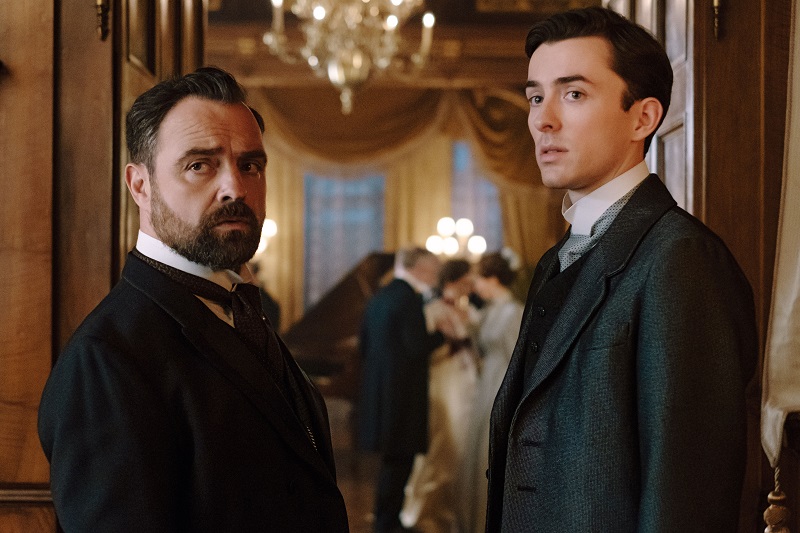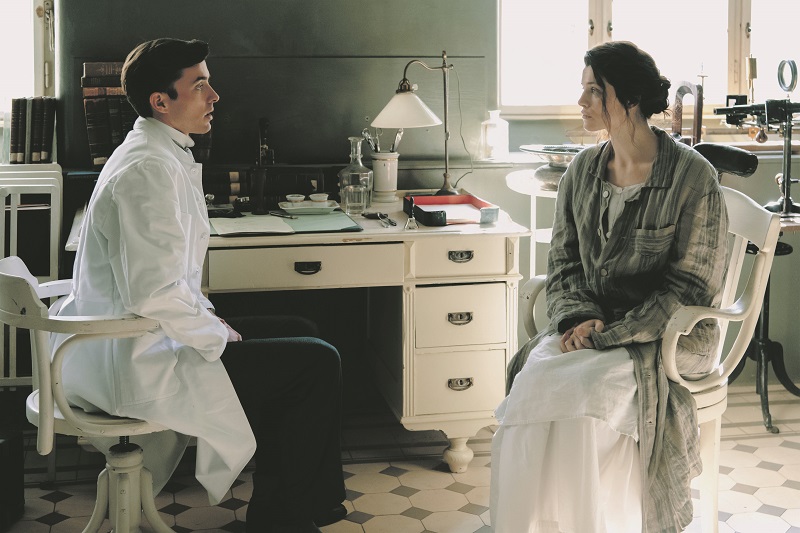Vienna Blood’s Jewish hero delves into the minds of criminals
Francine Wolfisz speaks to author Frank Tallis, whose Jewish doctor-turned-detective features in the sumptuous new BBC2 drama
Take a brusque murder detective struggling with a perplexing case, add a young Freudian disciple obsessed with the workings of the criminal mind and the result is a rip-roaring, turn-of-the-century crime drama with a Jewish twist.
Vienna Blood, which began this week on BBC2, is based on the best-selling novels by Frank Tallis revolving around young British-Jewish doctor Max Liebermann (Matthew Beard), who is called upon by Inspector Oskar Rheinhardt (Juergen Maurer) to use his skills of the fledging science of psychoanalysis to help crack the case.
The sumptuous three-part series, which involves Sherlock screenwriter Steve Thompson and Romanian-Jewish director Robert Dornhelm, was filmed entirely on location in Vienna and also stars Conleth Hill (Game of Throne), Charlene McKenna (Peaky Blinders), Amelia Bullmore (Gentleman Jack) and Jessica De Gouw (Dracula).
Get The Jewish News Daily Edition by email and never miss our top stories Free Sign Up
Tallis published his first Liebermann novel, Mortal Mischief, in 2005 and drew upon his many decades of experience as a clinical psychologist to create his lead character.
“The fact I wrote a crime novel is incidental,” explains Tallis, whose books have been translated into 14 languages.
“What really interested me was the psychology. If I have a criminal, I think in a detailed way about the criminal mind, whether his actions are believable and why the criminal would do something like that.”
As for where to set the action, the 61-year-old author enthuses that for a crime thriller steeped in psychoanalysis, “there was only one place it could be – Freud’s Vienna.”
Like his main protagonist, Tallis describes the father of psychoanalysis as a “hero”, alongside Gustav Mahler and Woody Allen.
In fact many of his influences are Jewish, though Tallis is himself not from a Jewish, but an Italian Catholic background.

That said, as a clinical psychologist practising in north London, he always felt “very much in touch with Jewish issues, because I was effectively having very intimate and deep conversations with Jewish patients” and became more aware as a result to such issues as assimilation and antisemitism faced by the community.
Of the latter he says: “Over the years it became more evident this isn’t an issue that we are past. It’s a curiously persistent and pernicious prejudice.”
Indeed, antisemitism is explored in his novels and on screen, with Liebermann and his family coming up against racist slurs and insults.
So too do we see his preference for psychoanalysis spurned by other medical professionals, who deem it a crank science for its “Jewish connections”.
“Lots of things were said that were very disparaging about psychoanalysis, because it was Freud’s idea and as such, a ‘Jewish’ science, so therefore fundamentally suspect and unsound,” explains Tallis.
But as the opening episode shows, with a patient undergoing unnecessary electric shock treatment, it was the mainstream methods of “curing” patients with psychological issues that were actually the more unsound.
“Treatments available to psychological patients at that time were equivalent to medieval forms of torture.
“Psychoanalysis was a very gentle and compassionate approach compared to the many other interventions that involved absurd treatments with no effect on a psychological condition.”
While Liebermann employs this new science to cure patients of their maladies, he also sees how psychoanalysis can be used to catch the criminal, simply by observing their behaviour or watching out for an incriminating, Freudian slip.

“In fact, there’s lots of similarities between what a detective does and what a psychoanalyst does,” enthuses Tallis.
“While one is looking for circumstantial evidence and physical clues, the other is trying to uncover repressed memories and create a profile.
“Put the two together and the result is very fruitful.”
Vienna Blood continues on Monday, 9pm, on BBC Two and is available on BBC iPlayer

Thank you for helping to make Jewish News the leading source of news and opinion for the UK Jewish community. Today we're asking for your invaluable help to continue putting our community first in everything we do.
For as little as £5 a month you can help sustain the vital work we do in celebrating and standing up for Jewish life in Britain.
Jewish News holds our community together and keeps us connected. Like a synagogue, it’s where people turn to feel part of something bigger. It also proudly shows the rest of Britain the vibrancy and rich culture of modern Jewish life.
You can make a quick and easy one-off or monthly contribution of £5, £10, £20 or any other sum you’re comfortable with.
100% of your donation will help us continue celebrating our community, in all its dynamic diversity...
Engaging
Being a community platform means so much more than producing a newspaper and website. One of our proudest roles is media partnering with our invaluable charities to amplify the outstanding work they do to help us all.
Celebrating
There’s no shortage of oys in the world but Jewish News takes every opportunity to celebrate the joys too, through projects like Night of Heroes, 40 Under 40 and other compelling countdowns that make the community kvell with pride.
Pioneering
In the first collaboration between media outlets from different faiths, Jewish News worked with British Muslim TV and Church Times to produce a list of young activists leading the way on interfaith understanding.
Campaigning
Royal Mail issued a stamp honouring Holocaust hero Sir Nicholas Winton after a Jewish News campaign attracted more than 100,000 backers. Jewish Newsalso produces special editions of the paper highlighting pressing issues including mental health and Holocaust remembrance.
Easy access
In an age when news is readily accessible, Jewish News provides high-quality content free online and offline, removing any financial barriers to connecting people.
Voice of our community to wider society
The Jewish News team regularly appears on TV, radio and on the pages of the national press to comment on stories about the Jewish community. Easy access to the paper on the streets of London also means Jewish News provides an invaluable window into the community for the country at large.
We hope you agree all this is worth preserving.
-
By Brigit Grant
-
By Laurent Vaughan - Senior Associate (Bishop & Sewell Solicitors)
-
By Laurent Vaughan - Senior Associate (Bishop & Sewell Solicitors)
-
By Laurent Vaughan - Senior Associate (Bishop & Sewell Solicitors)
-
By Laurent Vaughan - Senior Associate (Bishop & Sewell Solicitors)





















